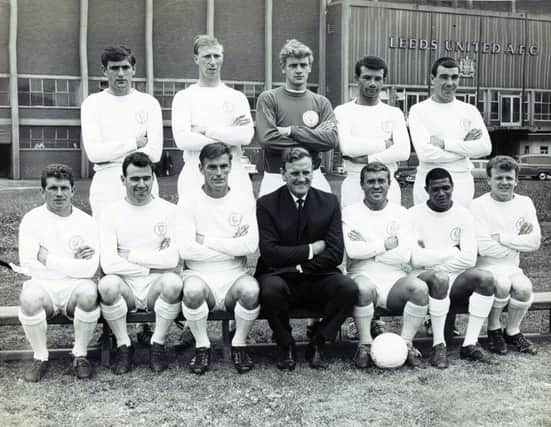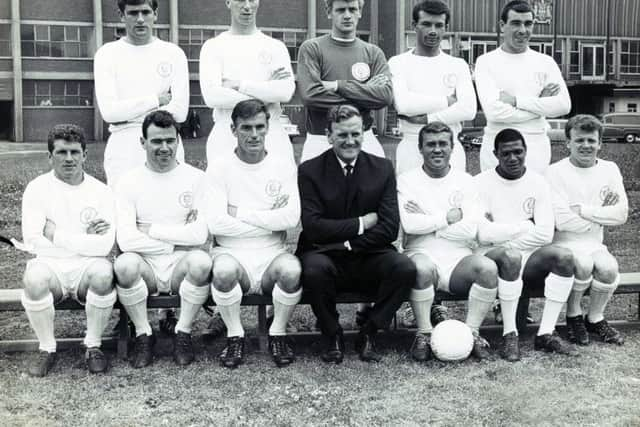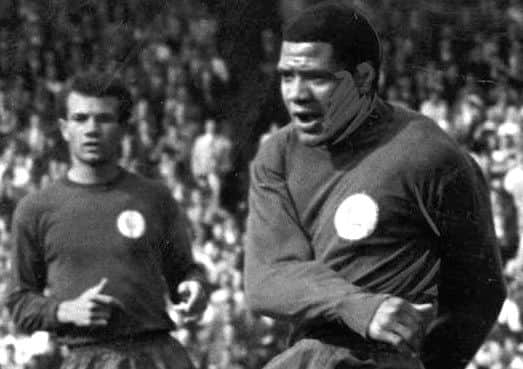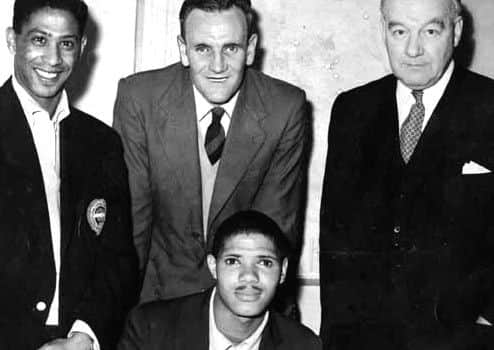Leeds United: Albert Johanneson, a sporting trailblazer


From a childhood blighted by poverty and apartheid in South Africa, Johanneson shot to fame with the great emerging Leeds United side of the sixties and became the first black footballer to play in an FA Cup final – only to lose everything as he drowned in a sea of isolation and alcohol.
After blazing a trail for the black players who followed in his wake, in 1995 Albert’s life came to a pitiful, drink-ravaged end, alone in a small Leeds council flat.
Advertisement
Hide AdAdvertisement
Hide AdNo-one feels the pride and the pain of Albert’s extraordinary life more than his daughters, Yvonne and Alicia. The 50th anniversary of that ground-breaking Wembley appearance, which is being formally marked by the FA at this year’s final, will be a deeply poignant occasion after years of struggling to come to terms with their father’s legacy.


Looking back, Yvonne, who will be in Wembley’s royal box on Saturday, encapsulates Albert’s life with heartfelt clarity: “When you add up all of the things my father endured; living as a child in a home with alcoholism, growing up in an apartheid society, transplanted from poverty to star status with little preparation, receiving praise from some fans on the one hand, and overt prejudice from others on the next; falling prey to the same alcoholism, which he tried to fight early on in his career, which then leads to his losing his marriage, his children, his home, his livelihood... it’s a lot to deal with.”
Subsequently it was a lot for the two sisters to deal with. After having to leave the family home when the drinking became impossible to live with and ultimately relocating to the US, their trauma was intensified by desperate attempts to locate their father when they found out he was virtually destitute. Alicia says: “There are really no words to describe the depth of sadness and grief we feel about that, especially when, as we grew older, we made several attempts to get in touch with him to help him, only to have all inquiries into his whereabouts turn into dead ends.”
It had all begun very differently. Albert arrived in Leeds in 1961 after being recommended for a trial by a schoolteacher in South Africa, Barney Gaffney, to whom he later gifted his cup final shirt. He helped Leeds to promotion to the First Division in 1964 and the cup final the following year. He was newly married to Norma, a Jamaican-born pharmacy assistant, two children arrived and life was, seemingly, good.
Advertisement
Hide AdAdvertisement
Hide AdYvonne remembers family outings to Harrogate and York in Albert’s pride and joy – his Rover 2000 – trips to the cinema, long drives into the country and regular visits to restaurants to indulge Albert’s love of food from around the world.


Alicia remembers him always wanting the family to watch Top of the Pops and Albert enjoying his daughters dancing along. She says: “I distinctly remember him playing the reggae version of Young, Gifted and Black by Bob Andy and Marcia Griffiths, and I thought it was the best song in the whole world back then.”
But life for the young, gifted and black Albert Johanneson was soon to fall apart. A life born into South African racism and, as the daughters later found out, the alcoholism of his own father, came undone as Britain’s own brand of racism, a lack of self-belief and ultimately the bottle pulled at the frayed edges.
During their formative years in Leeds, Yvonne and Alicia were too young to appreciate the era’s festering racism, including their father’s commonplace experience of monkey chants and bananas thrown by supporters. “Alicia and I were grown women when we came to understand that he was so severely discriminated against by opposing fans and even the players on other teams,” Yvonne says.
Advertisement
Hide AdAdvertisement
Hide Ad“My mother said that she always found it odd that he never wanted her to come and see him play – ever – but now she has a better understanding of why that could have been. It now appears obvious that he wanted to protect her from hearing the racial slurs being hurled at him and safeguard her from being the brunt of such ignorance.”


The contradictory mix of racism and adulation was difficult to handle for a shy man who, when he came to the UK, initially struggled with the notion that black people could officially have equal status with whites.
Finding it hard to cope, he leaned more and more on the bottle. Yet Albert didn’t drink at all when he first arrived in Leeds. Yvonne says: “My mother says that as far as she can recall, my father began to drink when his team mates invited him out after the games. At first, she said he had told her that he didn’t want to go out, but eventually he did, I guess to build the necessary camaraderie with his team mates.”
As alcohol began to exercise more influence over Albert’s life, his career began to wane. By 1974, Norma could no longer put up with the drinking and the behaviour and moved the family to Jamaica and then the US.
Advertisement
Hide AdAdvertisement
Hide AdAlicia never saw her father again, something which haunts her to this day. Yvonne did see him once in the 1980s when, while studying in France, she made a visit to Leeds. “I actually spent a night with him at his home,” she says.
“It wasn’t the best place, but he fixed up the front room for me and made sure I had clean sheets, a hot meal and an egg and bacon breakfast in the morning. He was very protective and constantly reinforced the importance of my keeping fit and healthy... no smoking and no drinking.”
The sisters only belatedly learnt there was a history of alcoholism in the family after a childhood friend of their father’s visited them in the US. “He told us that our father’s father, ‘grandad’ who used to live with us in Leeds, used to drink heavily and would become quite violent when he did. When he told us we realised how cyclical alcohol addiction and the disturbing behaviour patterns it can cause in some people can be. Our hearts really bled for our dad, especially when relatives told us that he used football as his escape from the turmoil in his home.”
Before the trip to Wembley, Yvonne will make a visit to the National Football Museum in Manchester to deposit some dearly held mementoes from Albert’s career. Unbeknown to Alicia and Yvonne, late in Albert’s life he asked Freddy Apfel, a local lawyer and friend, to look after his medals should anything happen to him.
Advertisement
Hide AdAdvertisement
Hide AdYvonne says: “It meant more than the world to know that he had kept the medals intact and wanted me and Alicia to have them, given that his addiction had kept us estranged for most of our lives. He obviously knew their value and treasured them dearly.”
Alicia adds: “For me, more than the medals symbolising his success as a footballer, they reflect his love for us and that’s all one could ask for really.”
• A fast, skilful winger, Albert Johanneson was one of the legendary Don Revie’s first signings after arriving from South Africa in 1961.
He went on to make 200 appearances and score 68 goals for Leeds United as the club began its rise to the top of the English game. He helped the club to promotion to the First Division in 1964 and the FA Cup Final the following year.
Advertisement
Hide AdAdvertisement
Hide AdIronically, Albert’s historic appearance in the cup final is also seen as a turning point. After a relatively poor performance in the game itself, which Leeds lost 2-1 to Liverpool, his place came under pressure from another future Leeds great, Eddie Gray, and the South African’s career began to peter out.
A move to York City in 1970 lasted a couple of years before he retired.